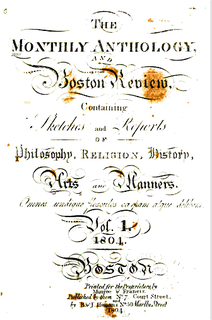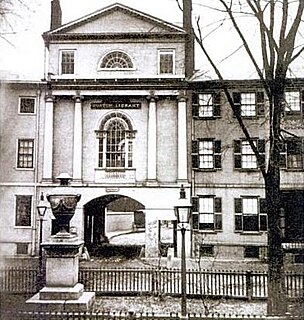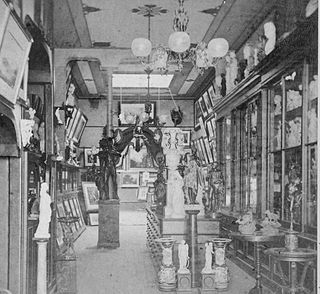Related Research Articles

Charles Bulfinch was an early American architect, and has been regarded by many as the first native-born American to practice architecture as a profession.

The Boston Athenaeum is one of the oldest independent libraries in the United States. It is also one of a number of membership libraries, for which patrons pay a yearly subscription fee to use Athenaeum services. The institution was founded in 1807 by the Anthology Club of Boston, Massachusetts. It is located at 10 1/2 Beacon Street on Beacon Hill.

The Monthly Anthology and Boston Review was a miscellaneous magazine published by the Anthology Club of Boston, Massachusetts from 1804–1811. The more famous North American Review is generally considered to be its successor.

Asher Benjamin was an American architect and author whose work transitioned between Federal architecture and the later Greek Revival architecture. His seven handbooks on design deeply influenced the look of cities and towns throughout New England until the Civil War. Builders also copied his plans in the Midwest and in the South.

Josiah Quincy III was an American educator and political figure. He was a member of the U.S. House of Representatives (1805–1813), Mayor of Boston (1823–1828), and President of Harvard University (1829–1845). The historic Quincy Market in downtown Boston is named in his honor.

The Boston Library Society was an American subscription library established in New England's pre-eminent city, Boston, during 1792. Early subscribers included Revolutionary War figures Paul Revere and William Tudor. The society existed until 1939 when it merged into a larger historical library known as the Boston Athenæum.

The Concert Hall (1752–1869) was a performance and meeting space in Boston, Massachusetts, located at Hanover Street and Queen Street. Meetings, dinners, concerts, and other cultural events took place in the hall.
Samuel Hale Parker (1781–1864) was a publisher and bookseller in 19th-century Boston, Massachusetts, United States. He published musical scores as well as novels, sermons, and other titles. He operated the Boston Circulating Library, and was among the founders of the Handel and Haydn Society.

Harding's Gallery in Boston, Massachusetts, exhibited works by European and American artists in the 1830s-1840s. The building on School Street also housed a newspaper press; the Mercantile Library Association; the Boston Artists' Association; and artists' studios. The building's name derived from painter Chester Harding, who kept his studio there.
William Pelham (1759–1827) was a bookseller and publisher in Boston, Massachusetts, in the late 18th and early 19th centuries. He kept a shop and circulating subscription library at no.59 Cornhill, 1796-1810.

De Vries, Ibarra & Co. were "importers of paintings, engravings, bronzes, and works of art in general," "publishers of busts and statuary," and "importers and publishers of books in foreign languages." Based in Boston, Massachusetts, in the 1860s the firm kept a shop in the Albion Hotel building on Beacon Street, and later on Tremont Street. Proprietors included Guy Horvath De Vries and Mrs. De Vries. Staff included Carl Schoenhof, who bought the firm in 1870.
John Dabney (1752–1819) was a postmaster, publisher, and bookseller in Salem, Massachusetts, in the late 18th and early 19th centuries. He was born in Boston in 1752 to Charles Dabney and Elizabeth Gardner. With Thomas C. Cushing, John Dabney published the Salem Mercury newspaper, 1787-1789. In 1790 he married Abigail Mason Peale (1767-1834). Beginning around 1790 he ran the "Salem Book-Store" which offered books for sale or short-term rental; customers included William Bentley. Dabney also served as Salem postmaster ca.1792-1815. He belonged to the North Church in Salem and the Essex Lodge of the Freemasons. Dabney sold the contents of his shop at auction in 1818. He died in 1819.
John Bowyer Nichols (1779–1863) was an English printer and antiquary.
Nathaniel Stone Simpkins was a bookseller, publisher, and legislator in Massachusetts in the 19th century. He ran a bookshop and circulating library in Boston ca.1820-1830. "In 1835 he established the Barnstable Journal [of Barnstable, Massachusetts], and in 1856 he established the Yarmouth Register" of Yarmouth, Massachusetts. Simpkins served as a "Representative to the General Court of Mass. in 1836, 1850 and 1851."
Munroe & Francis was a publishing firm in Boston, Massachusetts, in the early 19th-century. Established by David Francis (1779–1853) and Edmund Monroe, the business operated from offices on Court Street and Washington Street. In the 19th century the firm expanded to include Samuel H. Parker as partner, and was called Munroe, Francis & Parker until 1810. In 1802–1804 Munroe & Francis issued the first Boston edition of William Shakespeare's works.

Isaac Knapp was an American abolitionist printer, publisher, and bookseller in Boston, Massachusetts. He is remembered primarily for his collaboration with William Lloyd Garrison in printing and publishing The Liberator newspaper.

James Stratford was a British printer, bookseller, and publisher in the late eighteenth and early nineteenth centuries who specialised in producing part-works which were sold in instalments for later binding. He originally worked with William Stratford but later traded on his own. He was made bankrupt in 1813 and kept in Fleet Prison.
References
- ↑ Boston Directory, 1805
- ↑ "Blagrove, William", WorldCat
- ↑ Davies Project. "American Libraries before 1876". Princeton University. Retrieved August 30, 2013.
- ↑ Charles K. Bolton (February 1907), "Circulating Libraries in Boston, 1765-1865", Publications of the Colonial Society of Massachusetts, Colonial Society of Massachusetts, 11, hdl:2027/mdp.39015013248599
- ↑ Catalogue of Pelham's Circulating Library, no. 5 School-Street. Removed from no. 59 Cornhill, Boston: Munroe & Francis, printers, November 1804
- ↑ "Union Circulating Library", Columbian Centinel, April 27, 1811. Cited in: William Arms Fisher (1918), Notes on music in old Boston, Boston: Oliver Ditson Company
- ↑ Monthly Anthology, April 1808, p. 228
- ↑ Willard Fiske (1859). The book of the first American chess congress: containing the proceedings of that celebrated assemblage held in New York in the year 1857 together with sketches of the history of chess in the old and new worlds. NY: Rudd & Carlton. pp. 367, 487.
- ↑ "Report of the Record Commissioners of the City of Boston, containing Boston births from A.D. 1700 to 1800", Records relating to the early history of Boston, Boston: Rockwell and Churchill, city printers, 24, p. 354, 1894